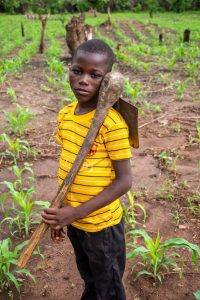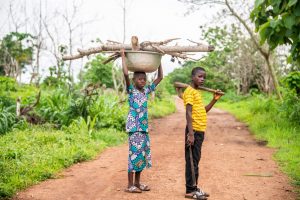How child labour destroys childhood joy
Others, Child Poverty , SufferingContributed by: Compassion Canada
Poverty does more than steal hope from a child’s future. It also steals the joy of their childhood.
Written by: Elizabeth St. John
The sound of children laughing and shrieking as they jump through front lawn sprinklers while their bare feet run freely through freshly cut blades of grass.
The tune of the ice cream truck hearkening boys and girls on their scooters and bikes as they follow the familiar melody with the gusto of that “just-out-of-school” joy.
The familiar and catchy repetition of camp songs carried around the campfire after dinner as kids rustle their sticky hands through bags filled of sugary marshmallows.
These are the smells, sounds and images that may flood many of our minds when we think back to our own childhoods, or as we watch the kids in our community enjoy the simple freedoms of a carefree summer.
This is the joy of childhood, right? It is what we wish every child is able to experience.
Unfortunately, the joy and freedom we desire for children aren’t an everyday reality for so many around the world.
A burden too heavy to bear
Image captured above is a staged depiction of child labour. No children involved are child labourers.
Instead of bike races towards ice cream trucks and jumping through sprinklers with friends, many children wake up everyday knowing that if they do not work for a full day’s wage, their family may suffer.
This is something Raphael witnesses daily in his community.
Raphael is the director of a Compassion centre in Kpoguede, a community on the outskirts of
Togo’s capital city. He works hard to make the painful reality of child labour a thing of the past.
The main income activities in Kpoguede are farming, welding, masonry work, hairdressing, dressmaking and mechanics. Instead of going to school, children are quickly put to work alongside their parents.
“From the mere age of seven and above, they are sent into the mechanic, dressmaking, hairdressing and welding workshops as apprentices. You can also meet them working on building sites or gravel extraction sites, compelled to fulfill the same working hours as adults. Some families even rely on their children’s labor income to survive,” Raphael says.
For many children the lack of education coupled with their inability to explore, play and connect with other children on a frequent basis causes them to withdraw from others.
A compounded problem

Image captured above is a staged depiction of child labour. No children involved are child labourers.
According to UNICEF, what separates regular chores and even work from child labour is when the child involved is either too young, or the work is hazardous to both their physical and mental health, as well as their overall development.
Currently over one in five children in the world’s poorest countries are engaged in child labour.
And the issue has only gotten worse in Raphael’s community because of the effects of the COVID-19 pandemic.
With the increased cost of living due to lockdowns, more children had to join their parents in many forms of hazardous labour.
“Last year it didn’t rain enough, and sowed seeds dried out. Again, children were compelled to become laborers to ease the burden on their families. Many children abandoned their schooling to work. Those who didn’t want to drop out of school totally might go to school for one week and go to work for another,” Raphael says.
Allowing kids to be kids

When he first started campaigning in his community to spread awareness, approximately 18 per cent of the children were involved in child labour. Thankfully, through continued awareness seminars, discussions with caregivers and talking on the radio, they’ve been able to keep the numbers down even against the fluctuations that occurred from the impacts of the pandemic.
“Thankfully, no child from the centre has been involved in child labor. At the Compassion centre, we fight for child protection and children’s rights, because we exist to deliver children from poverty in Jesus’ name. Jesus is freedom, He brought us freedom, and I want children to grow up in total freedom,” Raphael says.
At Compassion, we believe that children everywhere should have the opportunity to simply be a child.

No child should have to work grueling hours day after day at the age of seven, worrying about if their day’s wage will help feed their other siblings. No child should have to fear for their life and safety while trying to help make ends meet.
“A child is supposed to enjoy his childhood, go to school, learn, study and discover his potential… Because a child is the future of the community and the country,” says Raphael.
And we agree, but we need your help to make this a reality.
Would you consider partnering with the work already being done by men like Raphael in Togo? Would you be the hands and feet of Jesus that sets children free from poverty?
By sponsoring a child you are changing their present reality and their future. You are allowing them to one day look back with a smile on a joyful and free childhood. The incredible gift of ensuring they get to just be a kid.
Originally published on: https://www.compassion.ca/blog/child-labour-destroys-joy/


